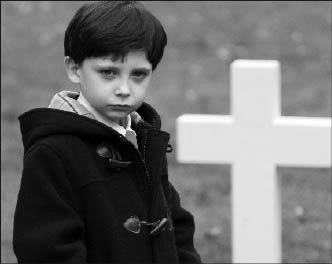Doing Business As Satan & Son
by George Sax

The hands-down, no-contest canniest casting coup in recent bigtime commercial film production has to be slotting Mia Farrow as the nanny from Hell (no mere metaphor, this) in Fox’s remake of the 1976, scavenged-from-the-Bible horror hit, The Omen. From the moment Farrow simpers and minces her way into a job caring for Katherine and Robert Thorn’s five-year-old son Damien (Julia Stiles, Liev Schreiber and Seamus Davey-Fitzpatrick, respectively) you just know her Mrs. Baylock is preternatural evil on the sensible-shoed hoof.
Since the Thorns’ previous nanny committed suicide by leaping from their roof with a noose around her neck and no replacement had showed up, the Thorns aren’t inclined to be choosy.
Mightn’t they have been a little more cautious, though? Particularly after Robert has just been appointed American ambassador to Great Britain after the sudden death of his boss, the previous appointee, the exit of that other nanny, Katherine’s uneasiness around her son and Mrs. Baylock’s arrival without notice from the employment agency? Haven’t either of them ever caught Dana Carvey’s SNL church lady routine? (“Well, I don’t know, how about…Satan?”)
But back to Farrow. Her appearance is just too delicious. The Connecticut horse-country Mother Hubbard, protector and adopter of scads of orphans from around the world (one of them did wind up as Mrs. Woody Allen, but sometimes kids can fool you) as a treacle sweet and smooth, steely purposed nursemaid to the Devil’s offspring, is a little coup de théatre. And her credentials are a lot better than the phony ones she gives the Thorns. After all, who in movies knows more about tending to satanic children? (Rosemary, the baby and all that.)
But director John Moore seems to be under the misapprehension that he’s used Farrow in a subtly effective manner, judging by the typically puffed magazine and newspaper pieces. There’s nothing obscure or sneaky in Farrow’s work here, and nothing else in Moore’s movie measures up to the fun she provides, even if she’s underutilized.
About 40 years ago, the late critic Vincent Canby called Gregory Peck’s acting style “ambassadorial.” Peck went on to play Damien’s adoptive father in the original movie and, compared to Schreiber, he was off-the-wall and over-the-top. Schreiber seems bemused, a little stunned and ponderous. (Maybe he can’t figure out how a nice Jewish boy wound up in this thing.) And Stiles just seems to lack the chops to chew her way into this kind of portentous nonsense.
The Omen, as you may recall, is kind of an upscale, cinematic penny-dreadful, scripturally inspired hash about a couple who are unwittingly raising the Devil’s anti-Christ son. It’s hard to believe anyone paying to see this won’t already know the premise, so its effectiveness largely depends on cleverness and style. For the very largest part, it lacks either.
Moore’s movie is thumpingly obvious and seems longer than its barely 100-minutes duration. And it’s unnecessarily murky in its plot details. It’s never explained how Pete Postlethwaithe’s doomfully hysterical priest comes by the secret of Damien’s heritage, and Michael Gambon, as a strange anti-Christ-expert, is on and off screen before you can figure out what he’s talking about.
There’s also a nagging question of taste, and maybe of ethics, although I’m reluctant to try to judge Hollywood product by either standard. The movie’s use of the September 11 attacks and the Southeast Asia tsunami (with footage) as harbingers of the prophesied apocalypse is a little distasteful. To utilize these horrendous events in such pretentiously perfervid cinematic pulp might be tempting, but it’s just a bit cheesy.
|
Issue Navigation> Issue Index > v5n23: Greed and the Demolition of the H-O Oats Elevator (6/8/06) > Film Reviews > Doing Business As Satan & Son This Week's Issue • Artvoice Daily • Artvoice TV • Events Calendar • Classifieds |









 Current Issue
Current Issue